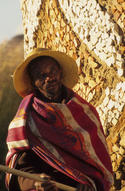Labourers in South Africa

The strongest influence on Lesotho's Basotho is their involvement as labourers in South Africa's mining and productive industry.
This represents their main source of income and has affected their practices. Its effects are obvious in their domestic arrangements, men separated for long periods from their families, and changes to how marriage is viewed, men as absentee wage-earners and women relict homemakers.
Bride wealth signifies men's right to demand support from their children once they are earning, rather than just their association with a kin group. Ancestors and diviners 'lingaka' are implicated in men's experiences as labour migrants and women's experiences of being left at home.
They are called upon to provide protection from dangers lurking in the mines and factories; they are expected to help heal injuries, physical and emotional, associated with such work; and they are turned to with the stresses faced by women left alone to care for children, fields and livestock with little, if any, money.